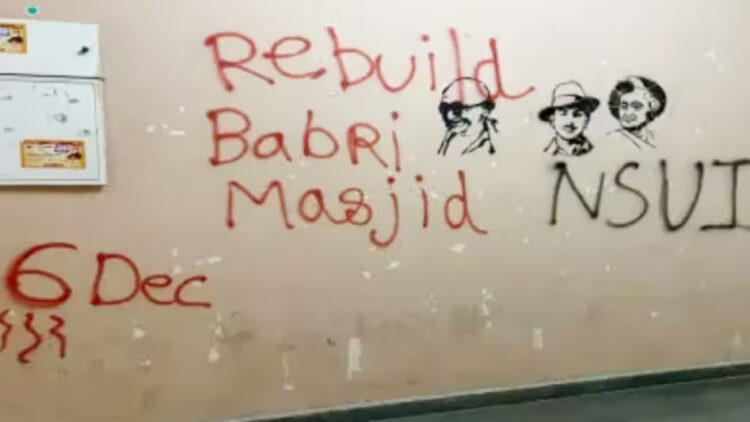In the lead-up to the highly anticipated Ram Mandir consecration ceremony slated for January 22 in Ayodhya, the Jawaharlal Nehru University (JNU) in Delhi finds itself embroiled in controversy as walls were defaced with slogans demanding the reconstruction of Babri Masjid.
Discovered on the first floor of the School of Language 2 building, the graffiti bears the message “Rebuild Babri Masjid 6 December,” with the name “NSUI” (National Students’ Union of India) seemingly associated with the act.
The inscription has triggered a wave of discussions and debate. However, NSUI, the Congress’s student wing, vehemently denies any involvement, asserting that the message was not inscribed by members of the student group. According to Sudhanshu Shekhar, the president of NSUI’s JNU unit, the organisation’s name was already present in black marker, and the controversial slogans were added later in red marker.
Shekhar contends that this incident is part of a larger conspiracy aimed at tarnishing NSUI’s image and has called for a thorough investigation by the JNU administration. The photos of the defacement, circulated widely on social media, have intensified the scrutiny on the university.
JNU’s Chief Security Officer, Naveen Yadav, expressed unawareness of the incident, highlighting that similar incidents targeting a specific caste had occurred in the past without investigations. The JNU vice chancellor and registrar were yet to provide an official response at the time of reporting.
This incident adds to a series of wall defacements at JNU. In December of the previous year, anti-Brahmin slogans like ‘There will be blood’ appeared on the walls of the School of Languages and School of International Studies. Two months ago, messages related to Kashmir were discovered.
The university had witnessed a previous defacement incident in October this year, with slogans like “Free Kashmir,” “Teri Kabra Khudegi” (Grave of yours will be dug), and “Bhagwa Jalega” sprayed on a building’s walls. Satish Garkoti, the rector of JNU, had then announced the formation of a committee to address such incidents, emphasising the installation of CCTVs in strategic locations across the campus.
While the Chief Proctor Office manual imposes a fine of Rs 10,000 for controversial slogans, the Language Study Centre lacks CCTV coverage, making it challenging to monitor and prevent defacement.
NSUI has urged the varsity administration to conduct a thorough investigation into the recent incident, emphasising the need to unveil the truth behind the defacement and its potential motives. As discussions unfold, the incident adds another layer to the ongoing discourse surrounding freedom of expression and campus decorum at JNU.




















Comments